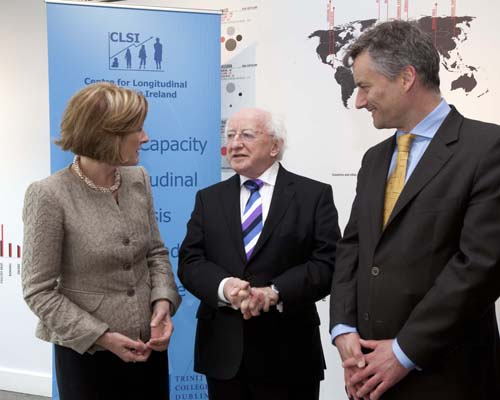President of Ireland Launches the Centre for Longitudinal Studies in Ireland
Posted on: 05 April 2012
The Centre for Longitudinal Studies in Ireland, a joint initiative between the ESRI and Trinity College Dublin, was launched by the President of Ireland, Michael D. Higgins on April 4th last. The Centre has been established to promote evidence based evaluation in a range of Irish public policy areas drawing on longitudinal social science data in the hope of getting better answers and solutions to important social and economic questions and to help Irish researchers develop the conceptual and methodological skills necessary to analyse these important data.
Like many other developed countries, Ireland has invested heavily in recent years in the collection of ‘longitudinal’ social science data. Longitudinal data are very powerful as they follow the same participants over time, and thus provide a real world data set to study complex social and economic issues across a range of policy areas from health to education, social inclusion to pensions.

President Higgins at the launch of the Centre for Longitudinal Studies in Ireland with Prof Frances Ruane, Director of ESRI and Dr Patrick Prendergast, Provost, TCD.
The largest and most important of these studies in Ireland have included families with young children as well as studies of persons over 50 years of age:
Growing Up in Ireland (GUI) is following close to 20,000 children from two cohorts of children (one from nine months and the second from nine years); these children have been re-surveyed at ages 3 and 13. ); It is being carried out by a consortium of researchers led by the ESRI and TCD.
The Irish Longitudinal Study of Ageing (TILDA) is following over 8,400 individuals aged 50+. Collection of the first wave of data was completed in 2010 and the second wave will be collected in late 2012. This study is being led by TCD in collaboration with an inter-disciplinary panel of scientific researchers including the ESRI.
The Centre for Longitudinal Studies in Ireland is one of the key initiatives under the strategic partnership between Trinity College Dublin and the Economic and Social Research Institute.
The combination of these new data, designed to cutting edge standards and new statistical methodologies can help provide a sound evidence base that will ensure that current and future public policy is effective and represents value for money for citizens.
GUI and TILDA have already contributed to policy development by:
– Improving ways to prevent heart disease, stroke, falls and dementia
– Understanding the role of early nutrition in child obesity risk
– Improving teaching practices to maximize educational development
Dr Patrick Prendergast, Provost, TCD said that: “GUI and TILDA make Trinity, and Ireland, a first port of call for researchers all over the world seeking information on childhood and ageing. Taking a leading international role in cutting edge research increases our country’s potential for creating highly skilled jobs and valuable technologies, thus contributing to Ireland’s development as an innovation hub.”
Prof. Frances Ruane, Director of the ESRI commented in her speech that: “High quality, longitudinal data are an essential tool for policy making in today’s world. Now, perhaps more than ever, Ireland needs to have the evidence that tells us what works, why it works, how it could work better and whether it is value for money. The CLSI will help us get the answers we need and be an invaluable support to Irish economic and social renewal.”
The launch was followed by the Centre’s inaugural lecture delivered by Prof James Banks of the University of Manchester on the theme of ‘Improving Knowledge and Policy: The Importance of Longitudinal Analysis. Prof Banks, Advisor on pension reform to the UK Government said: “Longitudinal studies, in some form or other, have become a large and invaluable component of the research infrastructure in both the UK and the US. The establishment of the CLSI to support and promote the development and use of longitudinal data for evidence based policy in Ireland is to be welcomed.”
Investment in TILDA and GUI is already contributing to international debate on important questions across a large number of disciplines and increasing the potential for creating new jobs and valuable technologies for the future.
